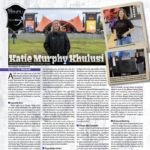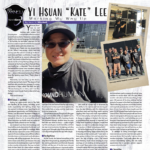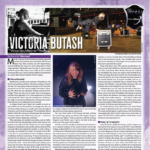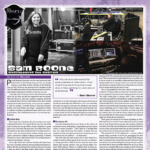
Note: With our Parnelli NextGen series, we profile up-and-coming live event professionals who have been making their mark on the industry. All are in the running for the “NextGen of the Year” Parnelli honor, which will be announced at the 21st Parnelli Awards ceremony in April 2023.
Mollie Autherson’s young pro audio career has landed her with a job many might not realize is a viable option. Basically, she goes to work for one of the most respected audio manufacturers in the industry and as a tech specialist, spends her day trying to break things. Specifically, DiGiCo audio consoles. In the London suburb of Chessington, she shows up to work as a “tester” of the company’s products (among other duties).

The Math and Physics of Sound
Born and raised in Surrey, UK, Autherson started trumpet lessons at the age of eight. She was proficient enough to play in several ensembles, and even got to tour Europe with county ensembles a couple of times, which included a gig at Royal Albert Hall. In her tweens, she took a left turn and got into metal music, teaching herself guitar. This coincided with her acquiring a MacBook laptop and the discovery of the GarageBand app. It would be her gateway to pro audio. YouTube DYI videos drew her further in, and in the final years of the UK’s equivalency of high school, she was studying Music Tech. Handling live music was part of her studies. “It was quite a low budget system that they threw together with old bits of kit that didn’t really work, but it was enough to start learning the basics like signal flow and how to use an analog console,” she says.
From there, she headed off to the University of Surrey. While there were plenty of places she could have gone to learn the turning-the-knobs aspect of audio, she chose Surrey because she wanted an education that included the math and physics of audio. Initially, she wanted to work in the recording side of pro audio but says she didn’t enjoy that part enough to want to do it as a career. “I’d spend far too many nights in the studio in the early morning hours waiting for bands to be creative.”
The school set her up with an internship at DiGiCo, where she was placed into the R&D department. Her job was to test the consoles and find the bugs in both new and updated software. “After a year of using DiGiCo consoles every day, I knew them inside-out,” she says. “I learned the parts of console engines and how they work together, and how the software code written for them works.” Relatively quickly, she became good at tracking down faults and figuring out where the problem was coming from. She also developed a deep understanding of what was possible — and what wasn’t. It was quite the education.
“I think it is quite common for students to start an industry placement thinking that they know almost everything, but then quickly realize that they really don’t! At the university, I learned the basics of sound and a little bit about a lot of topics like electronics and programming, which helped me to understand a bit of what the software and hardware guys here were talking about. But it was here where I learned about SMUX, Hi-Speed MADI, and so much more.”
She returned to school, finishing up in the Music and Sound Recording (Tonmeister) degree with honors. Then she headed back to DiGiCo who happily hired her. Since then, she has “fallen in love with the live audio industry.”

A Great Team
When she returned full time, she was initially in more of a sales role, handling demos and training and keeping the website’s technical information current. This is in addition to doing some video work for the company’s YouTube channel. “For most of the ones that I am on camera for, I write the scripts and sometimes do the video editing as well. The video work usually comes in waves. I’ll have a couple of months of no video work, and then have a couple of weeks where I do nothing but video. We did a series called ‘Quantum Theory’ last year, which is probably a good example of the kind of stuff we do.”
Now she is also testing again. “I’m quite excited to be in the R&D testing department, because they are always designing new products, and those testing are the first to use the new equipment.” She’s not at the workbench all the time, however. “I like going out and meeting the engineers and see our consoles being used — that’s when I do a bit of finger-crossing hoping nothing goes wrong,” she laughs. Out in the field, she talks to the audio engineers whenever she can to learn what they like about the console along with any suggestions for improvements.
Autherson has become knowledgeable with how a new product comes to be. “There are discussions of what that will look and sound like and the features we’re hearing that engineers want, and then the different teams go back to work on their part,” she explains. “The mechanics of it, the chassis and the software, etc., start to be developed. But what is really key is that the teams communicate with each other to make sure that something they are developing won’t cause a problem with another aspect. There’s a lot of back and forth before it even goes into testing.”
No Guarantees
There are no guarantees, either. “We can do five months of tests, and everything is going really well, and then you suddenly stumble on some bug that is definitely not acceptable. We find that it’s best to have a few testers approaching [that process] in different ways to ensure we catch everything we can.”
Autherson also likes having a lot of variation in her work, which keeps things interesting and educational. “Going to gigs has been a hobby of mine since I was young, and I love going to see my favorite bands and seeing them use our products.” She also goes to trade shows and exhibitions, and on occasion, she’ll talk with people who underestimate her technical knowledge. “The audio industry has always been male-dominated and there are still very few women on the technical manufacturing side,” she says. Her response is just to smile and prove them wrong.
One skill she finds critical is the ability to listen. “When I’m showing people how to use our consoles, I think the most important thing is to listen to them. Find out what they already know, what they don’t know, find out what sort of things they want to do with the console so that you can focus on features that will benefit them. There is no ‘one size fits all’ when it comes to console demos and training.”
Autherson has also found some free time to get out on her own and mix metal bands in local venues. But for the foreseeable future, she’s dedicated to becoming more valuable to the DiGiCo team. “It sounds cheesy, but it’s just a great team of people — they really feel like family. That social element is what makes the company special.” Could she ever see herself developing a new product? “Maybe I could get more involved with building something instead of trying to break it — though trying to break it is the fun part!”
At least for now.



